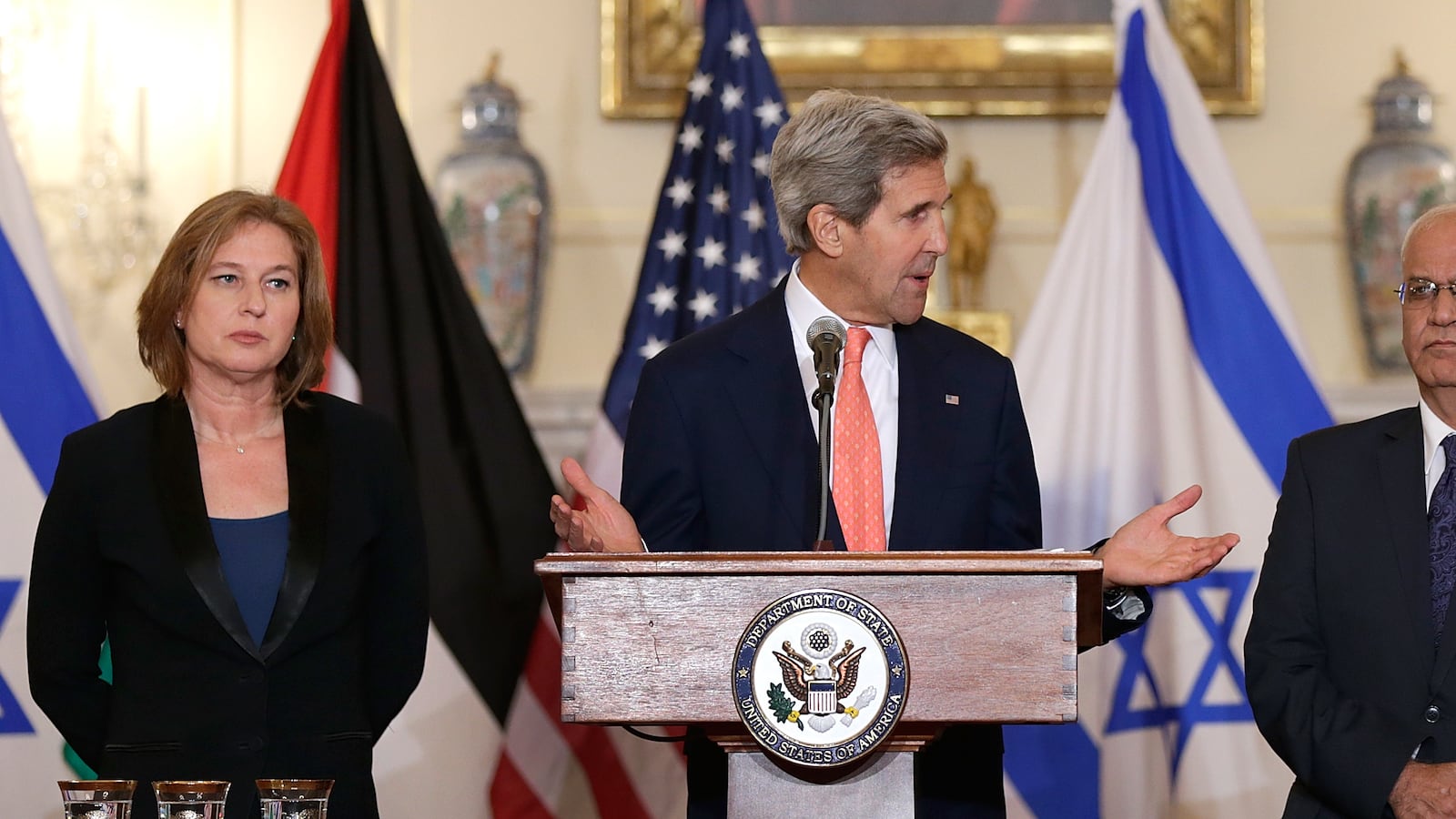Israeli and Palestinian negotiators are meeting again in Washington aiming to restart the often-attempted, never-successful process for peace—but it is the process itself that is the problem. For nearly half a century, Israel has occupied the West Bank and the Gaza Strip. During this time, it has colonized the territory with civilian settlements, extracted and exploited natural resources and spent billions of dollars on infrastructure for Israeli settlers and soldiers.

In the past 20 years alone, the number of Israeli settlers has tripled, far outpacing the growth rate of the rest of the Israeli population. The Israeli government continues to create financial incentives for Israelis to move to settlements and spend billions on a defense apparatus to secure their livelihood there. Most recently, the Israeli government advanced plans to build a massive railway network throughout the West Bank.
Despite this, successive Israeli governments have claimed that they are interested in peace and that they want to negotiate with Palestinians to come to a settlement based on a two-state solution. In short, while Israeli talk suggests the occupation is a temporary enterprise, Israeli actions make it clear that it is anything but.Actions, of course, speak louder than words. The same actions, however, repeated relentlessly for nearly half a century become impossible to ignore. Israel’s actions in Occupied Territory have convinced many people, Israelis and Palestinians alike, as well as governments around the world, that its intentions are to keep the West Bank forever.
Israel has always sought maximum Palestinian geography with minimal Palestinian demography. Their aim is to demographically engineer a Jewish majority at all costs. Perpetual occupation allows Israel to have its cake and eat it too while leaving crumbs for the Palestinians.
The problem with perpetual occupation for Israel is that, because it denies suffrage and other basic human rights to Palestinians because they are not Jews, its apartheid nature becomes more obvious over time.
Today, Israel is increasingly isolated internationally. Last year a vote tally at the UN General Assembly for Palestinian statehood showed only a handful of countries stood with Israel against the Palestinians. This year, the Europeans started moving toward punitive measures such as limiting trade with Israeli businesses or entities in Occupied Territory.
Israel is losing the battle over defining the narrative about its intentions. Resumed negotiations help Israel in its attempts to convince the world that its occupation is temporary, even though its actions continue to tell us that it is not.
The question is: who is still buying in? Many around the globe are already convinced that Israel plans to hold on to the West Bank forever and maintain an apartheid system until they are forced to abandon it. With every new settlement, every new piece of infrastructure, every passing day without a resolution in sight, that conviction only grows stronger.
Washington, Israel’s closest ally which has cornered mediation of negotiation for itself by using a persistent veto to stymie international efforts at the U.N. Security Council, has regularly acted as an enforcer of Israel’s position during negotiations instead of an enforcer of Israel’s obligations under international law and previous commitments.
The recent decision by the Israeli government to release 104 pre-Oslo Palestinian prisoners is a prime example of this. Israel committed to release the very same prisoners in 1999 but Washington failed to hold them to that commitment. Similarly, Israel committed to freeze settlements in the 2003 Road Map and Washington has likewise failed to hold them to that. What good is a process of negotiations when commitments—particularly those made by the stronger party—are left unenforced by an ostensibly credible mediator?
Israel is pleased with negotiations for negotiations’ sake. If they can, along with the United States, impose their will on the Palestinians and get them to accept a deal that leaves them with an impractical and indefensible demi-state of Bantustans, they might come to an agreement. If they can’t force such an agreement on the Palestinians, they will likely blame the Palestinians for the failure of the talks and key pro-Israel figures in the U.S. will support this narrative as well, allowing Israel to argue that it did all it could do and to effectively buy more time for the occupation.
To break this cycle, the U.S. must do something they have never been able to do in the peace process before: credibly and resolutely pressure Israel to comply with international law to achieve a just settlement.
If Washington cannot do that, then the negotiations that they have convened merely support an Israeli public relations campaign aimed at convincing the world that they are on their way out of the West Bank while they only entrench themselves deeper in it.
With growing momentum to isolate Israel internationally, talks for the sake of talks are an unwelcomed distraction.
The process itself has become an obstacle to peace.






